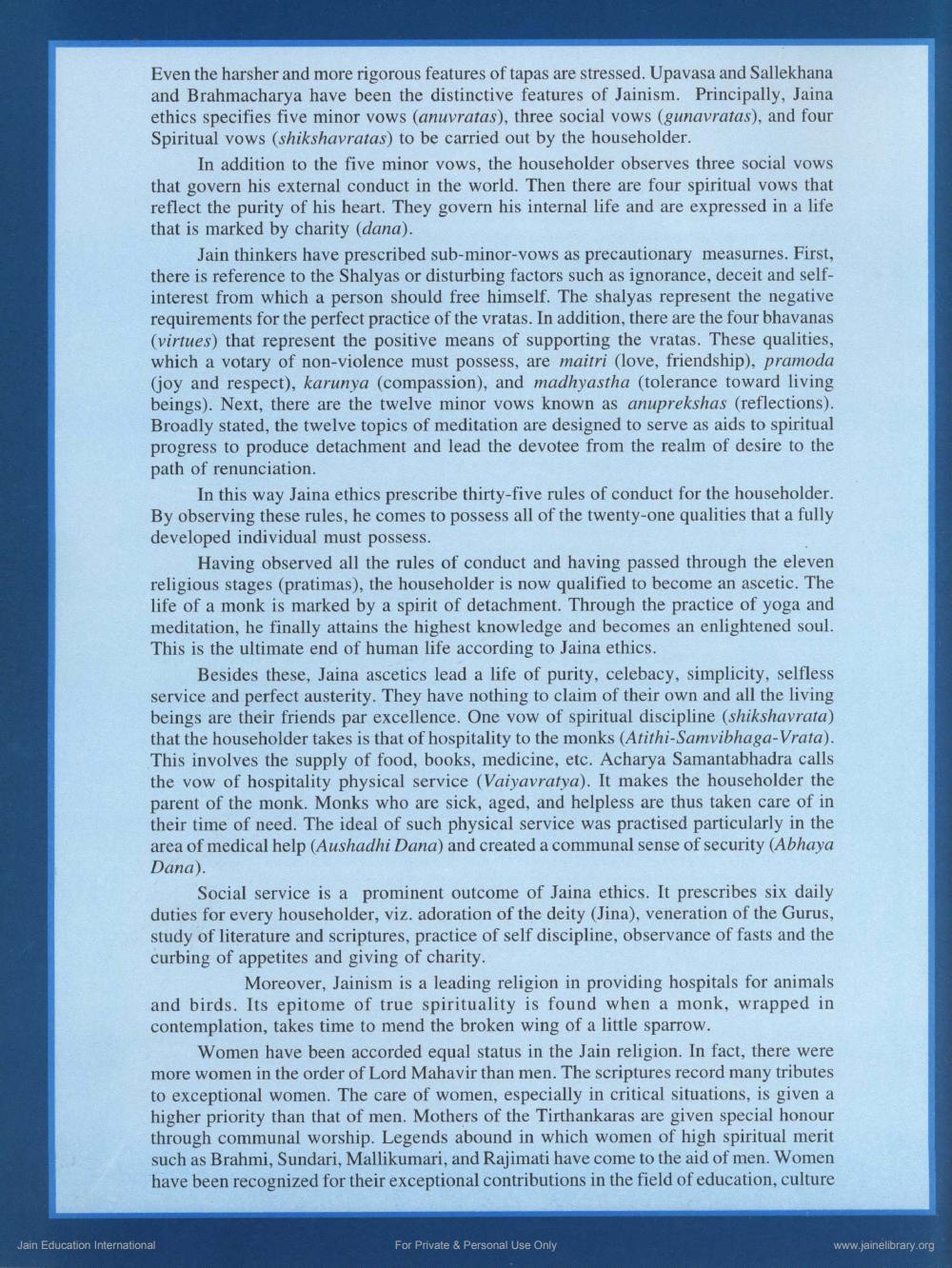________________
Even the harsher and more rigorous features of tapas are stressed. Upavasa and Sallekhana and Brahmacharya have been the distinctive features of Jainism. Principally, Jaina ethics specifies five minor vows (anuvratas), three social vows (gunavratas), and four Spiritual vows (shikshavratas) to be carried out by the householder.
In addition to the five minor vows, the householder observes three social vows that govern his external conduct in the world. Then there are four spiritual vows that reflect the purity of his heart. They govern his internal life and are expressed in a life that is marked by charity (dana).
Jain thinkers have prescribed sub-minor-vows as precautionary measurnes. First, there is reference to the Shalyas or disturbing factors such as ignorance, deceit and selfinterest from which a person should free himself. The shalyas represent the negative requirements for the perfect practice of the vratas. In addition, there are the four bhavanas (virtues) that represent the positive means of supporting the vratas. These qualities, which a votary of non-violence must possess, are maitri (love, friendship), pramoda (joy and respect), karunya (compassion), and madhyastha (tolerance toward living beings). Next, there are the twelve minor vows known as anuprekshas (reflections). Broadly stated, the twelve topics of meditation are designed to serve as aids to spiritual progress to produce detachment and lead the devotee from the realm of desire to the path of renunciation.
In this way Jaina ethics prescribe thirty-five rules of conduct for the householder. By observing these rules, he comes to possess all of the twenty-one qualities that a fully developed individual must possess.
Having observed all the rules of conduct and having passed through the eleven religious stages (pratimas), the householder is now qualified to become an ascetic. The life of a monk is marked by a spirit of detachment. Through the practice of yoga and meditation, he finally attains the highest knowledge and becomes an enlightened soul. This is the ultimate end of human life according to Jaina ethics.
Besides these, Jaina ascetics lead a life of purity, celebacy, simplicity, selfless service and perfect austerity. They have nothing to claim of their own and all the living beings are their friends par excellence. One vow of spiritual discipline (shikshavrata) that the householder takes is that of hospitality to the monks (Atithi-Samvibhaga-Vrata). This involves the supply of food, books, medicine, etc. Acharya Samantabhadra calls the vow of hospitality physical service (Vaiyavratya). It makes the householder the parent of the monk. Monks who are sick, aged, and helpless are thus taken care of in their time of need. The ideal of such physical service was practised particularly in the area of medical help (Aushadhi Dana) and created a communal sense of security (Abhaya Dana).
Social service is a prominent outcome of Jaina ethics. It prescribes six daily duties for every householder, viz. adoration of the deity (Jina), veneration of the Gurus, study of literature and scriptures, practice of self discipline, observance of fasts and the curbing of appetites and giving of charity.
Moreover, Jainism is a leading religion in providing hospitals for animals and birds. Its epitome of true spirituality is found when a monk, wrapped in contemplation, takes time to mend the broken wing of a little sparrow.
Women have been accorded equal status in the Jain religion. In fact, there were more women in the order of Lord Mahavir than men. The scriptures record many tributes to exceptional women. The care of women, especially in critical situations, is given a higher priority than that of men. Mothers of the Tirthankaras are given special honour through communal worship. Legends abound in which women of high spiritual merit such as Brahmi, Sundari, Mallikumari, and Rajimati have come to the aid of men. Women have been recognized for their exceptional contributions in the field of education, culture
Jain Education International
For Private & Personal Use Only
www.jainelibrary.org




